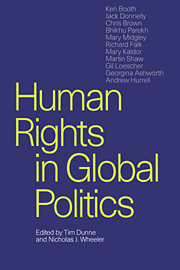Book contents
- Frontmatter
- Contents
- List of contributors
- Preface and acknowledgements
- Introduction: human rights and the fifty years' crisis
- I Theories of human rights
- II The practices of human wrongs
- 6 The challenge of genocide and genocidal politics in an era of globalisation
- 7 Transnational civil society
- 8 Global voices: civil society and the media in global crises
- 9 Refugees: a global human rights and security crisis
- 10 The silencing of women
- 11 Power, principles and prudence: protecting human rights in a deeply divided world
- 12 Learning beyond frontiers
- Index
7 - Transnational civil society
Published online by Cambridge University Press: 05 June 2012
- Frontmatter
- Contents
- List of contributors
- Preface and acknowledgements
- Introduction: human rights and the fifty years' crisis
- I Theories of human rights
- II The practices of human wrongs
- 6 The challenge of genocide and genocidal politics in an era of globalisation
- 7 Transnational civil society
- 8 Global voices: civil society and the media in global crises
- 9 Refugees: a global human rights and security crisis
- 10 The silencing of women
- 11 Power, principles and prudence: protecting human rights in a deeply divided world
- 12 Learning beyond frontiers
- Index
Summary
In this chapter, I argue that the concept of transnational civil society is less a descriptive or analytical term and more a political project. Indeed, I go further and suggest that, in the post-Cold War period, the fundamental political cleavage, which could define the way in which we view contemporary society and the way in which we address a whole range of problems, is likely to be less the traditional left/right divide but rather the division between those who stand for internationalist, Europeanist, democratic values, including human rights, and those who remain wedded to national or exclusivist thinking. The terms ‘civil society’ or ‘civic values’ have become forms of political shorthand that characterise the first group.
It is generally assumed that the term ‘civil society’ has been reclaimed from an earlier period, that its meaning is drawn from debates about the origins of liberal democracy in the eighteenth and nineteenth centuries. In fact, the historically specific circumstances in which the term re-emerged in the 1980s and 1990s changed the way it is used and vested the concept with new content. In particular, the early modern conception of civil society was socially and territorially bounded. What is new about the contemporary use of civil society is both its transnational character and its emphasis on participation. In effect, it represents a demand for a radical extension of democracy across national and social boundaries.
In developing this argument, I will schematically trace the evolution of the concept of civil society in Europe, especially during the 1980s and 1990s, and finally try to relate the concept to the growing debate about globalisation.
- Type
- Chapter
- Information
- Human Rights in Global Politics , pp. 195 - 213Publisher: Cambridge University PressPrint publication year: 1999
- 19
- Cited by

